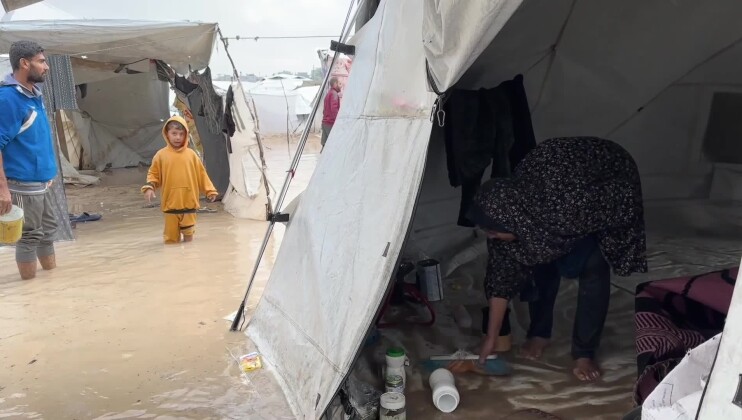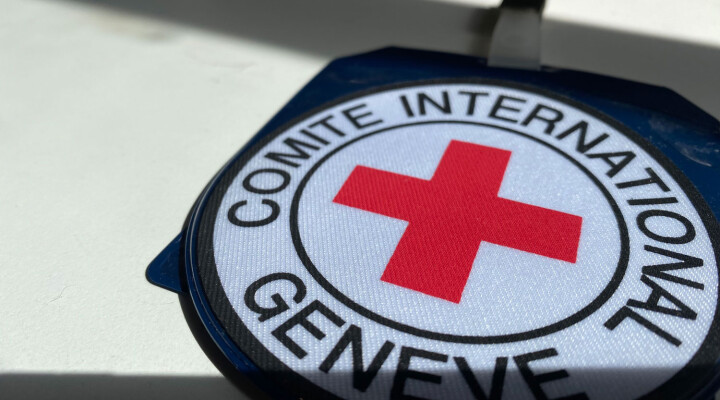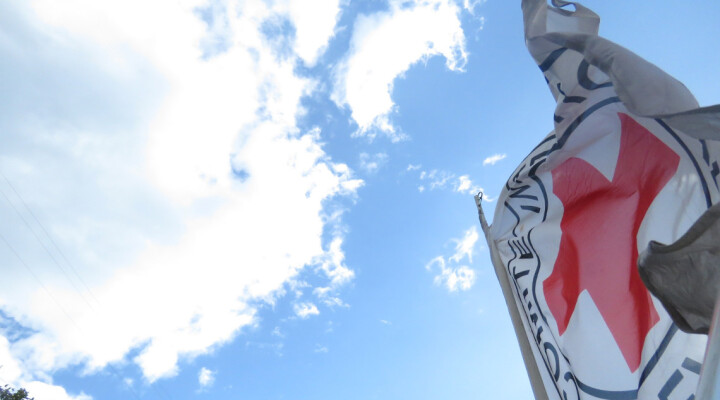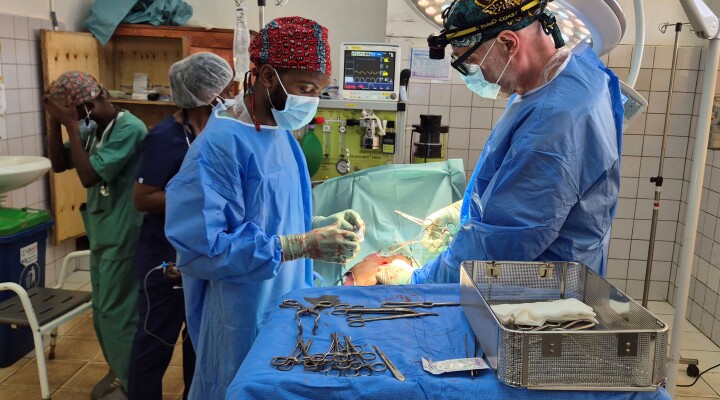Nigeria: Malnutrition rates rise as armed conflict and climate change hamper food production in the Lake Chad region
Severe malnutrition rates have risen sharply in healthcare facilities supported by the International Committee of the Red Cross (ICRC) in northeast Nigeria. Clinics report a 24% increase in the number of young children suffering from malnutrition compared to the previous year. The upward trend is a worrying sign that families in the Lake Chad region increasingly struggle to put food on the table.
"When I brought him here, he couldn't even sit on his own. His stomach was flat as if he had no intestines in his belly," said Rabiatu Jibrilla, whose two-year-old son is receiving treatment for malnutrition in the Mubi stabilization center.
In the second quarter of the year, the ICRC registered a 48% increase in severe acute malnutrition with medical complications among children under five in health facilities it supports compared to the same period in 2023. The ICRC has been providing clinical care and therapeutic food to the centers.
According to humanitarian agencies` estimates, 6.1 million people in the Lake Chad region will experience food shortages in the coming months due to conflict and the effects of climate change - the highest number in four years.
The protracted armed conflict, which has intensified in the first half of the year, is one of the main drivers behind the deteriorating food crisis. It has displaced millions, destroyed livelihoods, and is severely impacting access to agricultural land.
"We do not have enough farmland. Before, we used to go out in the fields to farm. But now, the armed groups have taken over the bush. Nobody can go to the bush to farm," said John Paul Ezra, a farmer in Madagali village, Adamawa State.
The region's heavy reliance on subsistence farming made it vulnerable to the effects of climate change, like irregular rainfall, which also considerably hampers food production. In northeast Nigeria, the harvest season's start coincided with heavy floods that washed away seeds and hope of harvest after an arid lean season, and the consequences are devastating. "We have people who fainted and are at the hospital. Others have died because there is not enough to eat," said Abubakar Bello Duhu, a farmer in Kwata Kwamla village in Adamawa state.
The ICRC has been working with the national Red Cross societies and local authorities to provide emergency cash and help communities build resilience, distributing seeds and tools and vaccinating cattle. It has also been reminding the parties of the conflict about their obligations under international humanitarian law to ensure that people have access to the essential means of survival and humanitarian aid.
"We are trying to strengthen our support, but the needs are way beyond what we can achieve," said Francesca Piccin, the head of the ICRC sub-delegation in Mubi, Nigeria.
LOGLIST
Location: Mubi, Shuwa and Madagali, Adamawa state, Northeast Nigeria
Length: 7:07
Format: MP4
Camera person: Timothy Benson
Producer: Adavize Baiye
Filming date: 26.09.2024
Copyright: ICRC access all
Language: English and Hausa
00:00 – 00:17: Wide shots of Mubi General Hospital
00:18 – 00:26: Exterior wide shot of the stabilization center at Mubi General Hospital.
00:27 – 00:34: Wide shot of a patient inside the Mubi stabilization center.
Rabiatu Jibrilla, Patient – Stabilization Center, Mubi General Hospital
00:35 – 00:43: “My son was healthy when I delivered him, but at 1 year 9 months old, I stopped breast feeding him.”
00:44 – 00:46: “He began to lose weight.”
00:47 – 00:54: “We thought it was linked to him not being able to get breast milk.”
00:55 – 01:00: “The doctor said he was malnourished and was giving injections and drugs.”
01:01 – 01:07: “When I brought him, he couldn’t even sit on his own.”
01:08 – 01:15: “His stomach was flat, you would think he has no intestine inside his belly.”
01:16 – 01:22: Wide shot of two mothers with malnourished children inside the hospital ward.
01:23 – 01:32: Close up shot of a malnourished child. Inside the ward.
01:33 – 01:38: Close up shot of a mother inside the stabilization ward.
Francesca Piccin, ICRC Head of Sub-Delegation - Mubi
01:39 – 01:48: “We are at the stabilization centre in Mubi and I can tell you that since the last time I was here, the number of patients has increased drastically.”
01:49 – 02:04: “If you compare June, July, August and September of 2023 to the same months of 2024, you will find that there are two or three times the number of children admitted in the stabilization centre.”
02:05 – 02:21: Various shots of a doctor attending to a mother and child at the stabilization center.
02:22 – 02:39: Various close-up shots of a doctor checking the MUAC measurements of a malnourished child.
Rabiatu Jibrilla, Patient – Stabilization Center, Mubi General Hospital
02:40 – 02:43: “We have other children at home.”
02:44 – 02:56: “He is the only malnourished one amongst them, but I have seen other malnourished children in my neighbourhood.”
02:57 – 03:14: Various shots of mothers and children at the stabilization center.
Francesca Piccin, ICRC Head of Sub-Delegation - Mubi
03:15 – 03:37: “When we are looking at the drastically increased numbers that we see in the stabilization centre and everywhere in the country, It’s not only linked to the conflict that has plagued Nigeria in the last few years but it’s also linked to climate change and the flooding that we’ve seen in the last few months, some of the worst flooding that Nigeria has experienced in the last few years.”
03:38 – 03:55: “Many organizations have lost part of their funding, so they’ve had to reduce their activities. Luckily for us, we are continuing, we are strengthening our approach and support but it’s not going to be enough because the needs are way beyond what we can achieve.”
03:56 – 04:15: Various wide shots of a flooded river in Shuwa town.
04:16 – 04:49: Various mid and close-up shots of a flooded river with people crossing in Shuwa town.
04:50 – 05:03: Shot of an uprooted tree caused by the flooding in Shuwa town.
05:04 – 05:34: Various shots of a farmer inspecting his barren farm after his crops were destroyed by the floods.
Abubakar Bello Duhu, Farmer – Shuwa, Adamawa
05:35 – 05:41: “Surely, the effects of this will not be felt now, until next year.”
05:42 – 05:46: “There will be food shortages and hunger in the coming months.”
05:47 – 05:54: “We have people who fainted and are in hospital, others are dead because there’s no food to eat.”
05:55 – 06:01: “Many people died because of this flood. They did not know what to do. They have lost hope.”
06:02 – 06:16: Various shots of a farmer inspecting his barren farm after his crops were destroyed by the floods.
John Paul Ezra, Farmer – Madagali, Adamawa
06:17 – 06:20: “We do not have enough farmlands because we used to go to the fields before to farm,”
06:21 – 06:23: “but now the armed groups have taken over the bush,”
06:24 – 06:27: “no one can go to the bush to farm anymore.”
06:28 – 06:33: “We all scramble for the available farmlands around, the land is not sufficient for everyone.”
06:34 – 06:40: “We just get small parcels just to ensure everyone has a portion to cultivate. We do not have big fields to cultivate.”
06:41 – 07:07: Various general shots of people in Shuwa town.
ENDS
For further information please contact:
Eleonore Abena Asomani, ICRC Dakar, +221 781864687, easomani@icrc.org
Follow the ICRC on facebook.com/icrc and twitter.com/icrc



